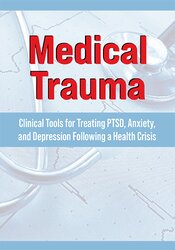

Your clients with medical trauma know that a health crisis can upend life at any moment.
And they know that crisis doesn’t end when the physical body is stabilized.
The impacts of medical trauma are as broad as they are misunderstood. Many mental health problems can arise from experiences like heart attack, stroke, intubation and mechanical ventilation, emergency Caesarean section, allergic reaction, seizure, accident-related amputation, cancer diagnosis, and more.
While some clients may have entered your practice with the unique presentation of PTSD that results from medical trauma, many more have likely come to you for help with other clinical issues that could be fueled by a past health crisis. Think of the client with depression who also has a history of heart failure. Or the client with social anxiety whose irritable bowel disease is listed on your intake form but never gets discussed. Or the client with dependency issues in their relationships who harbors a deeply entrenched sense of fragility related to a congenital illness.
Watch medical trauma expert Dr. Sacha McBain for this training that will help you understand the interconnectedness of the mind and body. You will learn to:
Your clients with medical trauma have associated treatment with danger. Purchase today to provide them with a trauma-informed approach to promote physical and psychological recovery!
Planning Committee Disclosure - No relevant relationships
All members of the PESI, Inc. planning committee have provided disclosures of financial relationships with ineligible organizations and any relevant non-financial relationships prior to planning content for this activity. None of the committee members had relevant financial relationships with ineligible companies or other potentially biasing relationships to disclose to learners. For speaker disclosures, please see the faculty biography.
Continuing education credit information is coming soon for this non-interactive self-study package.
CEs may be available for select professions, as listed in the target audience. Hours will be dependent on the actual recording time. Please check with your state licensing board or organization for specific requirements.
There may be an additional fee for CE certificates. Please contact our Customer Service at 1-800-844-8260 for more details.
**Materials that are included in this course may include interventions and modalities that are beyond the authorized practice of your profession. As a licensed professional, you are responsible for reviewing the scope of practice, including activities that are defined in law as beyond the boundaries of practice in accordance with and in compliance with your professions standards.

Michelle Flaum, EdD, LPCC-S, DCMHS, is author of the first book dedicated solely to the topic of medical trauma, Managing the Psychological Impact of Medical Trauma: A Guide for Mental Health and Health Care Professionals and founder of the Certificate in Medical Trauma-Informed Care at Xavier University, which is the first training program of its kind worldwide. A Fellow of the American Mental Health Counselors Association, and Dual-Diplomate, Clinical Mental Health Counseling Specialist in Trauma Counseling and Integrated Behavioral Health Care Counseling, Dr. Flaum has worked with the California Maternal Quality Care Collaborative/Stanford University and The Council on Patient Safety in Women’s Healthcare to develop assessment tools to help clinicians provide improved quality of care for patients who experience medical trauma. She is a strong advocate for integrating mental health professionals into treatment teams to enhance the patient experience and improve patient care, and her assessment tools and protocols are used throughout the world. She is the medical trauma specialist and executive board member for Live the Pain, an international organization of professionals based in Tel Aviv, Israel working to bring innovative solutions to the management of pain. Additionally, Dr. Flaum has been featured throughout the media, including NPR’s All Things Considered, Doctor Radio on SiriusXM, Health Professional Radio, Refinery29, Social Work Today, Psychotherapy Networker, Counseling Today, Healthcentral.com, The Conversation and Elle Magazine. More information can be found at www.michelleflaum.com.
Speaker Disclosures:
Financial: Michelle Flaum maintains a private practice and has an employment relationship with Xavier University. She receives royalties as a published author. Michelle Flaum receives a speaking honorarium and recording royalties from PESI, Inc. She has no relevant financial relationship with ineligible organizations.
Non-financial: Michelle Flaum is the Co-Founder and Vice President of Ohio Association of Counselors in Private Practice. She serves on the editorial review board for the Nursing for Women's Health. She is a member of the American Counseling Association, the American Mental Health Counselors Association, the International Society for Traumatic Stress Studies, and the Ohio Counseling Association.
Access never expires for this product.
Visit our FAQ page at www.pesi.com/faq or contact us at www.pesi.com/info
Satisfaction Guarantee
Your satisfaction is our goal and our guarantee. Concerns should be addressed to: PO Box 1000, Eau Claire, WI 54702-1000 or call 1-800-844-8260.
ADA Needs
We would be happy to accommodate your ADA needs; please call our Customer Service Department for more information at 1-800-844-8260.
PESI Mobile App
Access CE trainings on your phone or tablet through our free mobile app. Choose video or audio-only versions of online courses from the world’s best instructors, and complete your CE requirements anywhere, anytime, at your own pace.
Please wait ...